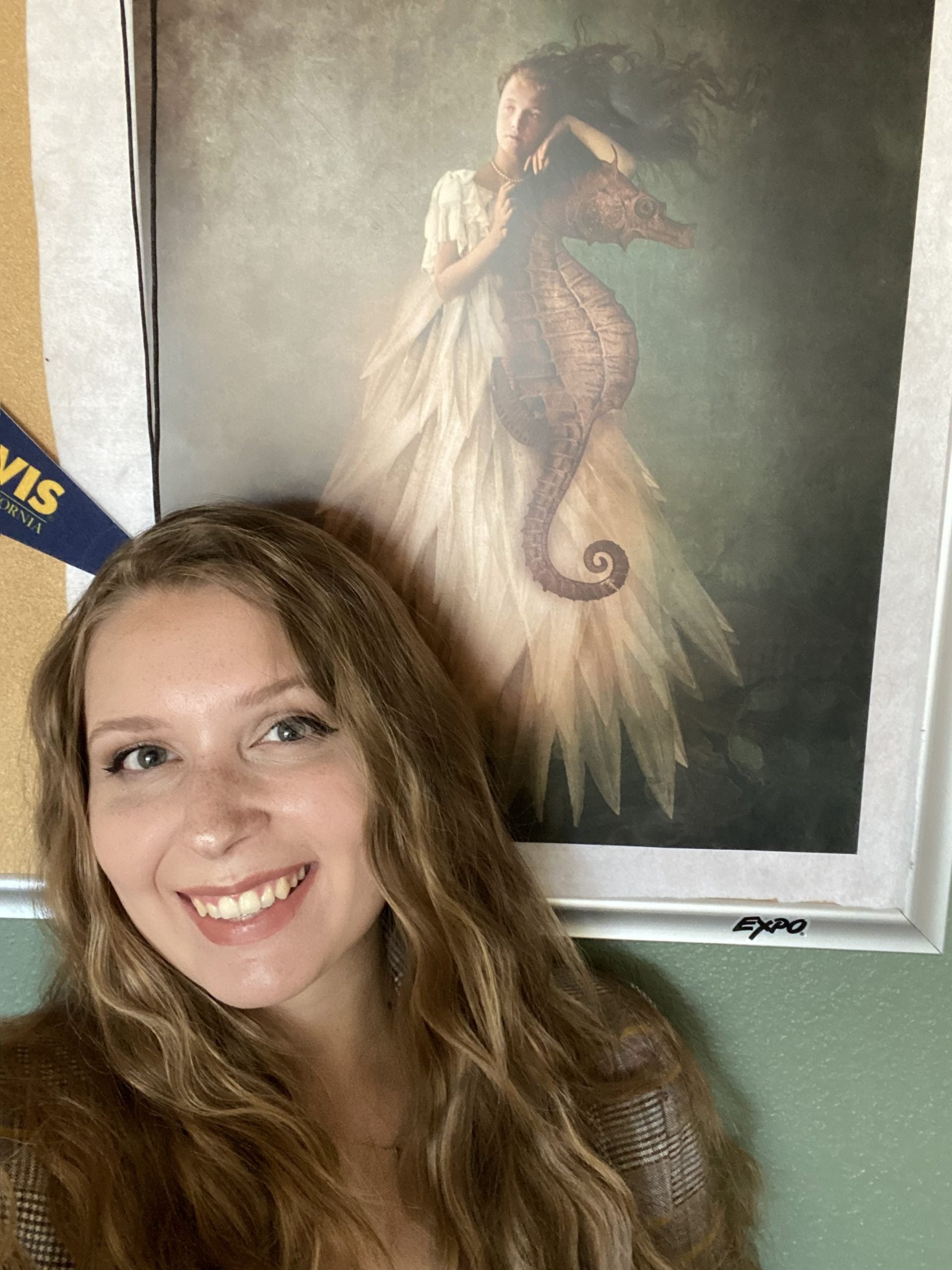My name is Sabrina Mederos, I am a PhD candidate and NSF GRFP fellow in the Animal Behavior graduate group!
Being responsible for so many growing up inspired me to ask questions about animals, exploring not just what they do, but why and how. I began my academic career at UC Davis back in 2016 when I was an undergraduate and fell in love with the research process. I studied Animal Science and Neurobiology and got involved in various labs around campus. I worked in a wide variety of labs with lots of species including pigs, dogs, quail, mice, and insects. I experienced first-hand how research and understanding of an animal’s perspective is crucial to providing them adequate welfare. My main work was doing research at the UC Davis School of Veterinary Medicine with Dr. Mikel Delgado. During my time there I assisted with feeding projects and eventually went on to form an interest in parental behaviors and attachment. With that, I helped conduct a nest separation study, and through the McNair Scholars program I was able to conduct my own study looking at the effects of stereotypic behavior on orphaned neonatal kitten development.
I joined the Bales lab as a graduate student in 2020 after Dr. Bales had decided to jump into the world of marine biology to understand pair bonding from a new perspective. Broadly, we are interested in the neurobiological and epigenetics factors that are involved in the maintenance and formation of pair bonding in the lined seahorse (Hippocampus erectus). More specifically, I’m interested in understanding their unique courtship behaviors, and testing for the presence of some of the more classically recognized pair bonding characteristics such as mate guarding, partner preference and stress buffering. Additionally, we hope to have a better understanding of the seahorse brain through examining both the neuroanatomy and expression of genes related to both pair bonding and brain organization. We do this by combining a wide variety of molecular techniques to assess the mechanisms driving these social behaviors.
In addition to my work with the seahorses, I continue to work in the prairie vole lab, helping with behavioral testing for our aging project that aims to understand how different social experiences affect a variety of behavioral and physiological outcomes across a lifespan.
I am also the current editor of the Science and Culture column for the Animal behavior graduate group’s online blog, The Ethogram. There we try to make cool science revolving around animals accessible to the general public and K-12 students.
Outside of the lab, I am a huge fan of video and board games. I often foster kittens through the Solano Kitten Network organization and adopt them out. I love to hike, do archery, and hang out with my amazing lab mates and ABGG cohort!
For more info you can check out my linked in page or email me at slmederos@ucdavis.edu
Publications:
Bales, K., Hang, S., Paulus, J., Jahanfard, E., Manca, C., Jost, G., Boyer, C., Bern, R., Yerumyan, D.,
Rogers, S., Mederos, S. Individual Differences in Social Homeostasis. Frontiers in Behavioral Neuroscience 2023
Mederos, S., L., Duarte, R., C., Mastoras, M., Dennis, M., Settles, M., L., Lau, A., R., Scott, A.,
Woodward, K., Johnson, C., Seelke, A., M., H., Bales, K., L. Effects of pairing on social behavior, color change and central gene expression in lined seahorses. Genes, Brains and Behavior, June 2022
Lowell, K., Delgado, M., Mederos, S., Bain, M. The effect of premature maternal separation on distress vocalizations and activity in kittens (Felis catus) during a brief nest separation. Applied Animal Behaviour Science, November 2020
Mederos, S. Orphaned Neonatal Kitten Suckling Behaviors and the Implications for Activity levels and Sleeping Patterns. Ronald E. McNair Scholars Journal. Winter 2019
Recent Publications
Relationships between cortisol and urinary androgens in female titi monkeys (Plecturocebus cupreus). Gen Comp Endocrinol. 2021
Parenting costs time: Changes in pair bond maintenance across pregnancy and infant rearing in a monogamous primate (Plecturocebus cupreus). New Dir Child Adolesc Dev. 2021
What is a pair bond? Horm Behav. 2021
Compositional variation in early-life parenting structures alters oxytocin and vasopressin 1a receptor development in prairie voles (Microtus ochrogaster). J Neuroendocrinol. 2021
Biobehavioral organization shapes the immune epigenome in infant rhesus Macaques (Macaca mulatta). Brain Behav Immun. 2021
Cannabinoid receptor Type 1 densities reflect social organization in Microtus. J Comp Neurol. 2021
Pharmacological Prevention of Neonatal Opioid Withdrawal in a Pregnant Guinea Pig Model. Front Pharmacol. 2021

 University of California, Davis (UCD)
University of California, Davis (UCD)